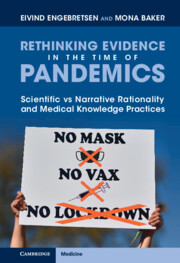Crossref Citations
This Book has been
cited by the following publications. This list is generated based on data provided by Crossref.
Fage-Butler, Antoinette
2022.
A values-based approach to knowledge in the public's representations of climate change on social media.
Frontiers in Communication,
Vol. 7,
Issue. ,
2023.
Berliner Thesen zum Pandemie-Management.
Das Gesundheitswesen,
Vol. 85,
Issue. 11,
p.
964.
Tretter, Felix
and
Simon, Karl-Heinz
2023.
Humanökologische Thesen für eine Wende in der Pandemieforschung: Eine personzentrierte, ökosystemische Gesundheitsforschung und -praxis ist nötig!.
GAIA - Ecological Perspectives for Science and Society,
Vol. 32,
Issue. 2,
p.
267.
Pfaff, Holger
and
Schmitt, Jochen
2023.
Reducing uncertainty in evidence‐based health policy by integrating empirical and theoretical evidence: An EbM+theory approach.
Journal of Evaluation in Clinical Practice,
Vol. 29,
Issue. 8,
p.
1279.
Joranger, Line
2023.
Healing and Meaning Making Through Storytelling and Poetry.
Human Arenas,
Russo, Federica
and
Hirsch, Paul
2023.
Navigating complex trade‐offs in public health interventions.
Journal of Evaluation in Clinical Practice,
Vol. 29,
Issue. 3,
p.
430.
Tretter, Felix
and
Marcum, James
2023.
‘Medical Corona Science’: Philosophical and systemic issues: Re‐thinking medicine? On the epistemology of Corona medicine.
Journal of Evaluation in Clinical Practice,
Vol. 29,
Issue. 3,
p.
405.
GREENHALGH, TRISHA
ENGEBRETSEN, EIVIND
BAL, ROLAND
and
KJELLSTRÖM, SOFIA
2023.
Toward a Values‐Informed Approach to Complexity in Health Care: Hermeneutic Review.
The Milbank Quarterly,
Vol. 101,
Issue. 3,
p.
646.
Tieu, Matthew
Lawless, Michael
Hunter, Sarah C.
Pinero de Plaza, Maria Alejandra
Darko, Francis
Mudd, Alexandra
Yadav, Lalit
and
Kitson, Alison
2023.
Wicked problems in a post-truth political economy: a dilemma for knowledge translation.
Humanities and Social Sciences Communications,
Vol. 10,
Issue. 1,
2024.
Incommunicable.
p.
161.
2024.
Incommunicable.
p.
1.
2024.
Incommunicable.
p.
275.
2024.
Incommunicable.
p.
53.
2024.
Incommunicable.
p.
81.
Wong, Kit Yee
2024.
The Symbiosis of Language(s), Literature, and the Medical Humanities.
Open Library of Humanities,
Vol. 10,
Issue. 1,
2024.
Incommunicable.
p.
149.
2024.
Incommunicable.
p.
41.
2024.
Incommunicable.
p.
29.
2024.
Incommunicable.
p.
265.
2024.
Incommunicable.
p.
283.





